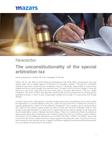
The unconstitutionality of the special arbitration tax
Article 130 of Law 1955 of 2019 (National Development Plan 2018-2022) introduced to the legal system again the so-called "special contribution for arbitration awards". Through this, arbitration awards of economic content that are rendered in favor of individuals, legal entities or autonomous estates that have a value greater than seventy-three (73) legal monthly minimum wages in force are taxed at a rate of 2% (and without the levy being able to exceed 1,000 Smlmv). This tax, initially created by Law 1819 of 2016, was declared unenforceable by the Constitutional Court because the legislative process in which it was incorporated violated the principle of consecutivity and flexible identity.
A lawsuit filed by the undersigned is currently pending before the Constitutional Court, which seeks the declaration of unenforceability of this tax, under the argument that it violates the principle of equality established in Article 13 of the National Constitution. Such violation occurs because those who resort to the ordinary justice system as well as those who resort to arbitration seek to have access to the administration of justice and it is detrimental to the right to equality to tax those who resort to alternative means of dispute resolution (Masc). There is no valid and sufficient constitutional reason that justifies discriminating the use of arbitral justice over the use of ordinary justice. Neither, the choice of one jurisdictional mechanism over another (this when "choice" is an option, since most of the times the forum is determined by a clause agreed long before the entry into force of the rule that imposes the tax) denotes, per se, a special contributive capacity that allows a differential taxation of one jurisdictional mechanism over another.
The arguments set forth in this lawsuit have been supported by control entities, institutes of thought and fiscal studies and by important universities in the country. In this regard, the Office of the Attorney General of the Nation indicated that "although the special contribution for arbitration awards of economic content (...) is acceptable from the tax point of view to finance certain judicial expenses, it is not acceptable from the point of view of equality. Based on the foregoing, the Legislator was able to impose the accused contribution under equal conditions for cases in which an economic ruling is issued, and regardless of whether the decision emanates from arbitration or ordinary justice". In the same sense, the dean of the Faculty of Law of the University of Ibagué indicated that "it is not found that there is sufficient justification to exclude persons who receive the same wealth by resorting to ordinary justice. Therefore, the tax may be imposed in a discriminatory manner on two subjects with the same contributive capacity and therefore it is considered to be openly unconstitutional". In turn, the Colombian Institute of Tax Law (ICDT) considered that this tax is not only discriminatory but also regressive since "two persons with different economic capacities may appear identically taxed by virtue of obtaining equal pecuniary sentences ordered in their favor by arbitration awards (...) since (...) it does not consult the real economic capacity of the taxpayer".
It is important that the Arbitration Centers of the country pronounce themselves before the Constitutional Court (an act that can be done even before the ruling on this) and make known their arguments in this regard because, with these levies, the future of the Masc in Colombia is at stake.


